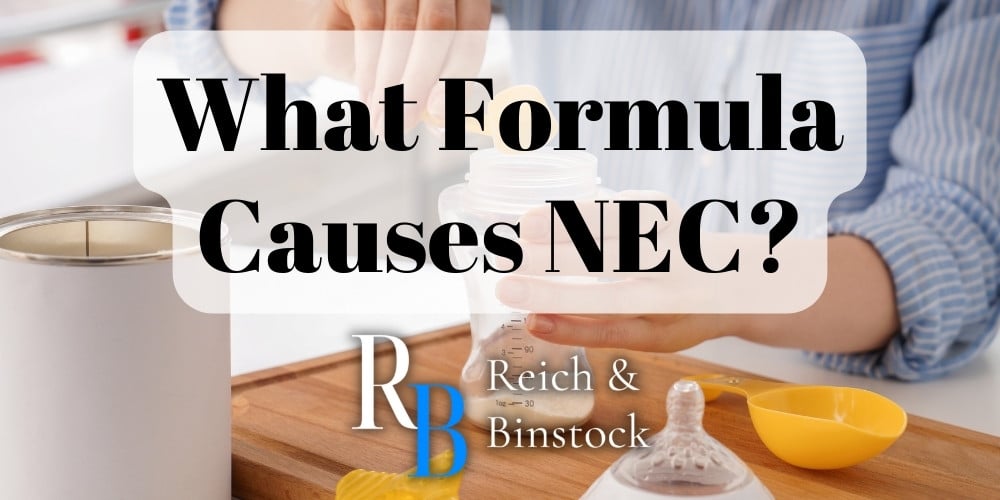Parents of newborn babies have a few significant reasons to worry about the safety of their babies lately, especially if their newborn was premature. On top of the ongoing national formula shortage, many lawsuits have been filed against some of the largest formula brands on the market. These lawsuits allege that certain cow’s milk-based baby formulas caused necrotizing enterocolitis (NEC) if ingested by premature infants. Many parents have wondered, “What formula causes NEC?” This blog aims to outline the different brands and products to be aware of for premature babies.
At Reich & Binstock, our product liability attorneys are investigating and litigating NEC baby formula lawsuit cases on behalf of parents whose children were affected. If your premature baby developed necrotizing enterocolitis after consuming cow’s milk-based infant formula in the neonatal intensive care unit or elsewhere, you may have a case. Contact Reich & Binstock at 713-622-7271 to schedule your free consultation with us. We will evaluate your claim and determine the best course of action for your situation.
What Is NEC?
Necrotizing enterocolitis (NEC) is a serious condition that involves inflammation of the intestines. If the condition progresses or is not promptly treated, it can begin to destroy the walls of the infant’s bowels. This can result in the contents of the intestines leaking into the abdomen. Premature babies are at a particularly high risk of this condition. In fact, NEC is one of the leading causes of gastrointestinal-related deaths in premature infants in the NICU.
This condition is very dangerous for all babies, but especially for premature babies. It affects anywhere from 5 to 12% of preterm infants with very low birth rates. It also leads to surgery in around 20-40% of cases and is ultimately fatal in 25-50% of cases. Manufacturers of these products failed to warn both parents and physicians about the dangers that their products pose to premature infants.
What Causes Necrotizing Enterocolitis?
The root cause of necrotizing enterocolitis (NEC) is a bacterial infection combined with the immaturity of the digestive system in premature babies. Specifically, the intestines become infected and inflamed from bacteria that is not normally present. According to the National Institutes of Health, other possible causes of NEC in premature infants include the following.
- Not having adequate blood circulation to the gut
- Being unable to digest and pass food through the gut, which leads to a buildup of toxic waste
- Inability of the gut to ward off dangerous bacteria
- Injury to the lining of the intestine
In addition to the above causes, the ongoing baby formula lawsuits cite using cow’s milk-based formula for preterm infants as a possible cause of NEC. While not every cow’s milk-based formula will cause NEC if ingested by a preterm infant, the risks of developing it are higher due to the baby’s immature digestive system.
Infants fed human breast milk are at much less risk of developing necrotizing enterocolitis (NEC). However, infant formulas are essential for many people for different reasons. For example, some parents cannot produce enough breast milk for the baby to have an exclusive human milk diet. Supplementing their diet with infant formulas helps ensure their baby gets the proper nutrition.
Which Babies Are at Risk for NEC?

As we stated previously, a premature baby would be more at risk of developing necrotizing enterocolitis (NEC) than a full-term baby. This is the basis of the NEC baby formula lawsuit claims. Because most major baby formula brands sell cow’s milk-based formulas, they have a responsibility to warn parents of the dangers of their products. However, their failure to warn parents of these dangers has resulted in many preterm babies suffering serious illnesses, and even death after consuming their products.
Parents and children who have been affected by this negligence deserve justice and compensation from liable baby formula manufacturers. Contact an infant formula lawsuit attorney if your premature infant suffered from NEC after consuming cow’s milk-based formulas.
Why Are People Filing Baby Formula Lawsuits?
The Enfamil and Similac infant formula lawsuits allege that, despite the existing evidence of a link between bovine milk-based infant formula and NEC, manufacturers failed to warn consumers of this risk. Enfamil and Similac are two of the largest defendants involved in the infant formula litigation. They are also two of the most popular baby formula brands on the market.
The lawsuits have been filed against manufacturers Mead Johnson and Abbott Laboratories, as their failure to warn parents has resulted in serious illnesses and deaths of preterm babies. Failure to warn lawsuits fall under product liability law, and for this reason, many parents are seeking help from personal injury lawyers with experience in product liability cases.
Similac Lawsuit
Similac, one of the leading brands of baby formula, is currently facing lawsuits for their negligent failure to warn about the dangers of a premature infant consuming their bovine formulas. The manufacturer, Abbott Laboratories, knew of the dangers associated with their products, yet did not include a warning on their packaging. This led to the illnesses and deaths of preterm infants.
Currently, there is an ongoing Similac Alimentum recall that affects countless parents and babies.
Enfamil Lawsuit
Enfamil’s manufacturer, Mead Johnson, has also come under fire for similar reasons, as their popular cow’s milk-based formulas have caused necrotizing enterocolitis for some premature babies. As an added consequence, recalls of both Similac and Enfamil formulas have worsened the existing formula shortage.
What Type of Formula Causes Necrotizing Enterocolitis?

Infants fed human breastmilk, human milk fortifier powder, or pasteurized donor human milk are unlikely to develop NEC as a result. When babies ingest cow’s milk-based products, this can introduce a certain type of bacteria to the intestinal cells. For full-term babies with more mature intestinal tissue, this is unlikely to be an issue. However, for extremely premature babies with immature intestines, this can lead to NEC. Immature intestines have a much more difficult time fighting off foreign or harmful bacteria. In severe cases of NEC, the baby may need to undergo surgery.
Do All Formulas Cause NEC?
No. However, babies who are fed breast milk are, in general, less likely to develop serious gastrointestinal issues such as NEC. If a parent cannot breastfeed or provide enough human milk for their child, there are many alternatives that are safer than bovine formulas.
- Human donor milk
- Human milk fortifier powder
- Non-dairy liquid protein formulas
If you are a parent of a premature infant, you may be able to obtain pasteurized donor human milk from organizations such as the Human Milk Banking Association. Speak with your doctor to learn more about your child’s nutritional options.
Contact a Baby Formula Lawsuit Attorney at Reich & Binstock
At Reich & Binstock, we understand the fear and panic that accompanies learning that your child has a serious illness. It can be one of the most stressful possible experiences. If your child was fed Enfamil, Similac, or other cow’s milk-based infant formulas, and they developed NEC, you might have a case. Contact our compassionate and experienced product liability lawyers to schedule your free consultation at 713-622-7271.














